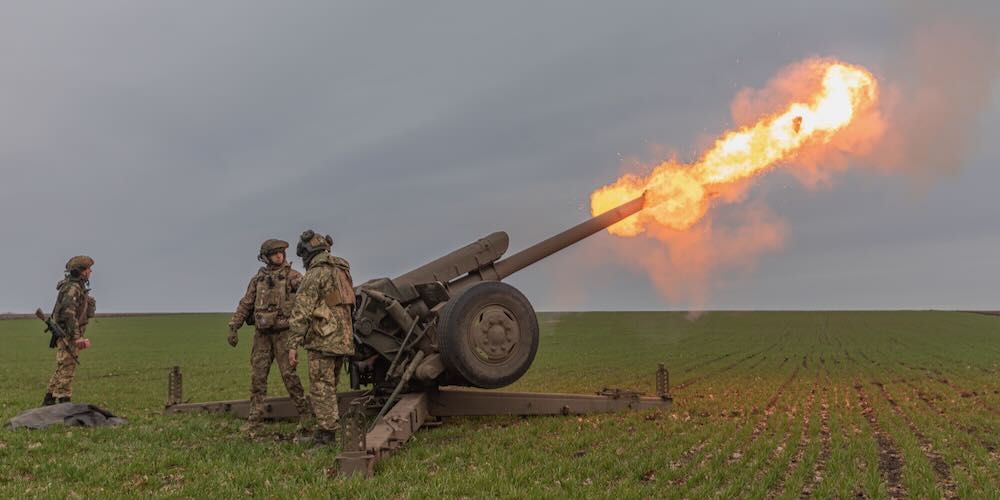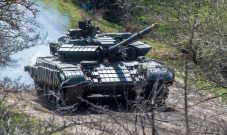There is no good reason to abandon Ukraine to Russia's murderous aggression.
Fighting for Freedom in Ukraine
As I wing my way toward a fifth mission in Ukraine, I find myself challenging (if not exactly questioning) my motives. On the one hand, it may simply be that “war is fun” as one retired Army officer pointed out. And yes, there is a certain thrill in running toward the sound of gunfire, living life at peak focus, and picking through the carnage of war. The Dutch call it ramptoerisme. But that’s not entirely convincing: there are scores of wars the world over which seem distinctly not-so-fun. I’m not flying to Khartoum, for instance.
There is the relative moral clarity of it all: Russia’s naked aggression, flagrant brutalities, and indiscriminate attacks are vile, and they light a fire in the belly. Again, though, one does not need to look far to see similarly morally outrageous acts. I’m not flying to Xinjiang or Haiti, either.
There is perhaps a degree of Eurocentric heritage at play—though racial solidarity doesn’t explain why there would be more sympathy for Ukrainians who are functionally indistinguishable from most Russians, nor does it explain the number of foreign fighters who are not of European descent, who eagerly risk their lives to help “the other” in Ukraine.
Maybe it is the historical familiarity—the aesthetics and motifs are so eerily recognizable: bomb shelters, train platforms, Resistance graffiti, and more. The train station in Amsterdam has signs in Cyrillic to indicate where Ukrainian refugees may convene, just steps from a WWII memorial to the liberation of Holland from the Nazis. The weather and terrain—even some of the weaponry—in Ukraine look like they came straight from A Band of Brothers.
The fight, for all its subtleties, nevertheless represents a clear contrast between a voluntary way of life and an authoritarian one—a clash of cultures and values that resonates deeply in our cultural DNA.
Maybe it’s the distinctly chivalric element—an urge to expend effort in a righteous cause, a chance to make an actual impact for good. A quote from John Stuart Mill that we were required to memorize at the Air Force Academy often drifts through my head:
The man who has nothing for which he is willing to fight, nothing which is worth more than his own personal safety, is a miserable creature and has no chance of being free unless made and kept so by the exertions of better men than himself.
Many of the fighters I know say they feel in Ukraine how they wish they had felt in Iraq or Afghanistan. There is a distinctly masculine energy at play: an urge to defend, to warrant a knowing glance from an appreciative woman. Perhaps, even, the urge to fight in Ukraine is a not-so-subtle response to the vitriolic gender debates of the Culture Wars at home. In Ukraine, muscle power and bravery are not swept into categories of “toxic” behavior, but are instead honored and appreciated. In contrast to the self-loathing so popular at home, it’s refreshing to find a common cause against a clear and present danger.
Perhaps the most salient ingredient in this heady brew is that the Ukraine War is, quite simply, today’s Big Deal. There is an international zeitgeist, a generalized sense of an ongoing world-historical event with deep implications that cannot be lightly dismissed. Clichéd as it sounds, it really does feel like “a moment for freedom.” The fight, for all its subtleties, nevertheless represents a clear contrast between a voluntary way of life and an authoritarian one—a clash of cultures and values that resonates deeply in our cultural DNA. It’s a “better dead than Red” moment that strikes a chord. Who knew that Red Dawn, cheesy as it was, would play out in Ukraine?
Are all these feelings shaped and manipulated by media coverage? Sure. Does Ukrainian PR sell better than Russian disinformation? Undoubtedly, at least in Western quarters. There may even be a certain amount of Lafayette-like naivety at play—an eager yen to be part of a clear historical opportunity to defend the good and the true.
And, frankly, the motivation is evolving. As more of the West, and Americans in particular, begin to soften in their enthusiasm for supporting Ukraine, it becomes ever more difficult to justify to my family and friends why I’m risking so much for so little gain for a fight so far away. The same people who once chucked me on the shoulder, looked me square in the eye, and said “Thank you for what you’re doing” now say, “Ukraine?! Why??!” My kids have become stoically silent on the subject—unlikely to brag to their friends about what their dad is doing. The semi-patriotic enthusiasm has dwindled to a kind of embarrassed murmur-and-change-the-subject. We have fires closer to home to put out, I’m reminded, and don’t expect a welcome home party.
Rereading Hemingway’s A Farewell to Arms is sobering. American volunteers in the Italian Army of World War I experienced the same kind of increasing ambivalence, trending toward disillusionment. War loses its luster. Of frontline assaults, Hemingway wrote that “the sacrifices were like the stockyards of Chicago if nothing was done with the meat except to bury it.” It can be applied, without much updating, to the outskirts of Bakhmut. I have witnessed the cold impartiality that artillery has for assaults and “meat,” I’m afraid, is a very apt picture.
So maybe it’s a fool’s errand. Or maybe we just can’t help ourselves—we’re pulled into the same beguiling trap as American volunteers in Cuba, Italy, Spain, and elsewhere. As Hemingway put it, “The world kills the very good and the very gentle and the very brave impartially.” Maybe we are just moths to a flame. Who knows?
But something big is afoot, and I’ll be damned if I’m going to sit this one out. I cannot shake the feeling that this is, in fact, a generational moment for liberty and decency—things that in the end are indeed worth fighting for.



